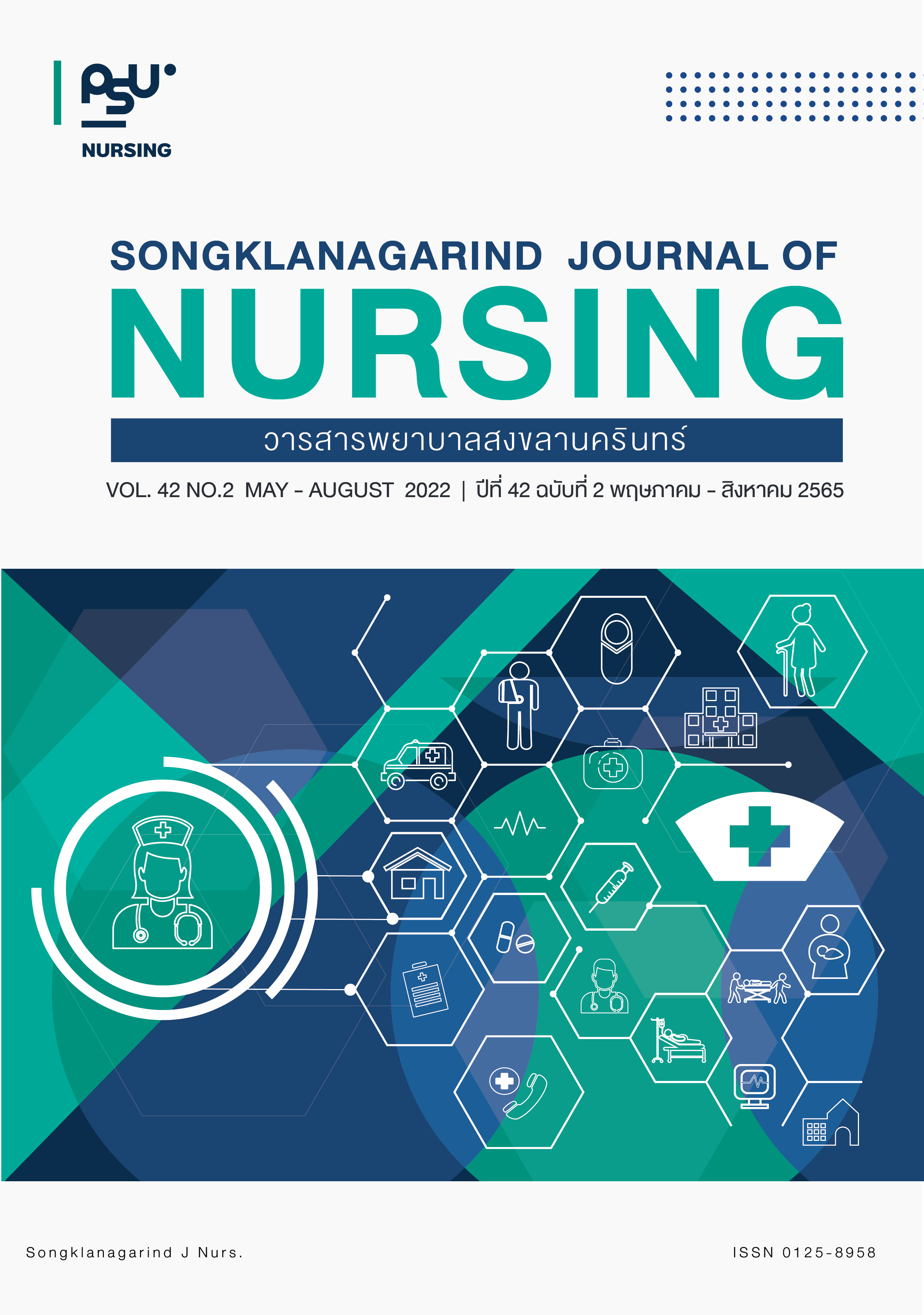การผสมผสานภูมิปัญญาตะวันออกในการปฏิบัติการพยาบาลของนักศึกษาพยาบาล
Main Article Content
บทคัดย่อ
วัตถุประสงค์: วิจัยเชิงคุณภาพแบบบรรยายนี้มีวัตถุประสงค์เพื่อศึกษาประสบการณ์ ปัจจัยส่งเสริม ปัญหาและอุปสรรคการใช้ภูมิปัญญาตะวันออกในการปฏิบัติการพยาบาลของนักศึกษาพยาบาล วิธีการ: กลุ่มตัวอย่างเป็นนักศึกษาพยาบาลชั้นปีที่ 2-4 ซึ่งมีประสบการณ์ขึ้นฝึกปฏิบัติการพยาบาลจำนวน 90 คน แบ่งเป็นชั้นปีละ 30 คน คัดเลือกกลุ่มตัวอย่างแต่ละชั้นปีตามคุณสมบัติที่กำหนดและใช้การสุ่มแบบกำหนดโควตา เครื่องมือที่ใช้เก็บข้อมูลประกอบด้วย 2 ส่วน ได้แก่ 1) แบบสอบถาม ได้แก่ แบบสอบถามข้อมูลทั่วไปและแบบสอบถามประสบการณ์การใช้ทักษะภูมิปัญญาตะวันออกในรายวิชาปฏิบัติ และ 2) แบบสัมภาษณ์ ได้แก่ แบบสัมภาษณ์ประสบการณ์ ปัจจัยส่งเสริม ปัญหาและอุปสรรคการใช้ภูมิปัญญาตะวันออกในการปฏิบัติการพยาบาล ตรวจสอบความตรงเชิงเนื้อหาโดยผู้ทรงคุณวุฒิ 3 คน และปรับแนวคำถามตามข้อเสนอแนะจากผู้ทรงคุณวุฒิ แล้วนำไปทดลองกับผู้ให้ข้อมูลจำนวน 3 ราย วิเคราะห์ข้อมูลส่วนบุคคลด้วยสถิติพรรณนา หาค่าความถี่ ร้อยละและข้อมูลจากการสัมภาษณ์ทำการวิเคราะห์เชิงเนื้อหา ผลการศึกษา: พบว่า ประสบการณ์การใช้ภูมิปัญญาตะวันออกในการดูแลผู้รับบริการของนักศึกษาพยาบาลแบ่งได้ 4 ด้าน ได้แก่ 1) การส่งเสริมสุขภาพ 2) การรักษา 3) การป้องกัน และ 4) การฟื้นฟูสภาพ โดยปัจจัยสนับสนุนที่ทำให้นักศึกษาพยาบาลผสมผสานภูมิปัญญาตะวันออกในการปฏิบัติการพยาบาล ได้แก่ หลักสูตรการเรียนการสอน การสนับสนุนของอาจารย์และพยาบาลประจำหอผู้ป่วย ความร่วมมือของผู้รับบริการ ส่วนปัญหาและอุปสรรคในการนำภูมิปัญญาตะวันออกไปใช้ในการดูแลผู้รับบริการ ได้แก่ การขาดความมั่นใจในการใช้ภูมิปัญญาตะวันออกแต่ละเทคนิค การไม่ให้ความร่วมมือของผู้รับบริการ และสถานที่ฝึกปฏิบัติการพยาบาลไม่เอื้อต่อการปฏิบัติเทคนิคภูมิปัญญาตะวันออก สรุป: ผลการวิจัยแสดงให้เห็นว่านักศึกษาพยาบาลชั้นปีที่ 2-4 มีประสบการณ์การผสมผสานภูมิปัญญาตะวันออกในการปฏิบัติการพยาบาล โดยมีเป้าหมาย 4 ด้าน คือ 1) การส่งเสริมสุขภาพ 2) การรักษา 3) การป้องกัน และ 4) การฟื้นฟูสภาพ รวมทั้งพบปัจจัยส่งเสริม ปัญหา และอุปสรรคในการผสมผสานภูมิปัญญาตะวันออกในการปฏิบัติการพยาบาลซึ่งสามารถนำไปใช้เป็นแนวทางปรับปรุงการเรียนการสอนต่อไป
Article Details

อนุญาตภายใต้เงื่อนไข Creative Commons Attribution-NonCommercial-NoDerivatives 4.0 International License.
เอกสารอ้างอิง
Buddharat U, Sen-Ngam K, Khamchan P. Using eastern wisdoms in nursing care for patients of registered nurse in the South of Thailand. Songklanagarind J Nurs. 2015; 35(2): 1-20. Thai.
National Health Commission Office. Strategies for the development of Thai wisdom, Thai health No.3 (2017-2021). 1 st ed. Bangkok: Usa printing; 2017. Thai.
American Association of Retired Persons and National Center for Complementary and Alternative Medicine Survey Report. Complementary and alternative medicine: 2011. AARP I NCCAM Survey report [Internet]. 2011 [cited 10 Jan 2020]. Available from: https://assets.aarp.org/rgcenter/health/complementary-alternative-medicine-nccam.pdf
Hatthakit U. Holistic nursing with an eastern wisdom integration. 1 st ed. Songkhla: Max media y2k press; 2014. Thai.
Soowit B, Panasakulkan S, Pongsathonviboon K, et al. Effects of using learning model for promoting the holistic palliative care among nursing students, Kuakarun Faculty of Nursing, Navamindradhiraj University. JRTAN. 2018; 19(1): 210-20. Thai.
Prasittivatechakool A. Alternative health and perspective to select without overlook. JRTAN 2014; 15(3): 38-43. Thai.
Lanwong T, Phakdeechanuan K, Boonyoung K, et al. The influence of attitude knowledge self-efficacy and outcomes expectation to integration of eastern wisdom in nursing practice of nursing students Faculty of Nursing, Prince of Songkla University. Songklanagarind J Nurs. 2021; 41(2): 77-88. Thai.
Manipantee S, Wiwatchankit W. The relationship among education’s learning achievement, attitude in studying, and modification of study complementary and alternative therapies of nursing students. KJN. 2015; 22(2): 91-106. Thai.
Nursing division, Ministry of public health. Role and performance of registered nurses. 1 st ed. Nonthaburi: Publishing of Suetawan Company Limited; 2018. Thai.
Health administration division, Ministry of public health. Operational Manual: Health services (promote, prevent, treat, rehabilitate and protect consumers). Samut Sakhon: Born To Be Publishing; 2016. Thai.
Panpinit S. Research techniques in social science. Bangkok: Wphat; 2010. Thai.
Rueanpan C. Research methodology in social science. Bangkok: Samatum; 2018. Thai.
Elo S, Kaariainen M, Kanste O, et al. Qualitative content analysis: A focus on trustworthiness. SAGE. 2014; 4(1): 1-10. doi: 10.1177/2158244014522633.
Suwanphong N, Theppan K, Howteerakul N, et al. Decision making on the utilization of Thai traditional medicine in general hospital, Ratchaburi province. JPNC, Chanthaburi. 2017; 28(2): 80-92. Thai.
Anti-Corruption Operation Center. Ministry of public health. Practicing meditation along with exercises that combine mind and body with the SKT meditation technique [Internet]. 2021 [cited 4 May 2021]. Available from: http://www.stopcorruption.moph.go.th/application/editors/userfiles/files/การฝึกสมาธิควบคู่กับการออกกำลังกายด้วยเทคนิค%20SKT.pdf
Pibral A, Hatthakit U. Spiritual care needs and spiritual care received among Muslim patients at the end of life in hospitals. [master’s minor thesis]. [Songkhla]: Prince of Songkhla University; 2009. 95 p. Thai.
Panyachotikun A, Satkong S, Sriwisit S. Effects of SKT meditation therapy for lowering blood pressure level of patients with hypertension in Sikao Hosptial, Trang province. SCNJ. 2017; 4(2): 245-55. Thai.
Deesom P, Naewbood S, Thojampa S. The effect of the health promotion program with standing breathing meditation exercise SKT2 among patients with uncontrolled hypertension. Journal of Nursing and Health Sciences. 2019; 13(2): 66-76.
Thai.
Prasawang N, Koshakri R, Jewpattanakul Y. Effects of the sitting breathing meditation combined with usual care on blood pressure among patients with essential hypertension in primary care unit. Journal of Nursing and Health Care. 2018; 36(1): 33-42. Thai.
Puripun N, Deethongkham D, Kunsara P. Development for clinical nursing practice guideline for pain management in end stage of cancer with SKT 8. NDJ. 2020; 47(1): 173-89. Thai.
Suvarnarong K. The path of yoga: The science challenging nurses’ role. J Nurs Sci. 2014; 32(4): 15-24. Thai.
Srisongmuang O, Karomprat A, Chinrat M, et al. The effect of foot reflexology program to relieve pain in patients with cancer. Srinagarind Med J. 2020; 35(3): 296-303. Thai.
Sritan S. Effect of foot reflexology massage with birthing exercise on levels of pain in postoperative abdominal surgery patients. JOPN. 2017; 9(1): 37-46. Thai.
The Institute of Thai Traditional Medicine, Ministry of Public Health. Tart chao reun. 2 nd ed. Bangkok: Wvothaiprinting; 2011. Thai.
Rujiganjanarat K, Hemtong W, Parno P, et al. An application of Thai traditional medicine program for promote healthy behaviors among elderly group with diabetes in Phetchaburi province. RTA Med J. 2018; 71(3): 183-91. Thai.
Phupun E, Skulphan S, Thungjaroenkul P. Mental health problems and spiritual needs among patients with cancer, Nakornping Hospital, Chiang Mai province. JPNMH. 2018; 32(3): 75-89. Thai.
Vazifeh Doust M, Hojjati H, Farhangi H. Effect of spiritual care based on Ghalbe Salim on anxiety in adolescent with
cancer. JORH. 2020; 59(6): 2857-65. doi: https://doi.org/10.1007/s10943-019-00869-9.
Chartsuwan J, Peanpadungrat P, Itharat A, et al. Comparative study on efficacy of physiotherapy and physiotherapy combined with Thai massage on rehabilitation outcome and quality of life of ischemic stroke patients with hemiplegia. TMJ. 2017; 17(3): 356-64. Thai.
Naewboot J, Kanchanatawan B. Effects of Thai traditional massage to anxiety, depression and pain level of patients with myofascial pain syndrome at the Clinic of Applied Thai Traditional Medicine, Faculty of Medicine, Thammasart University. Chula Med J. 2016; 60(3): 313-27. Thai.
Kongsuwan W, Aphichato A, Maneewat K. Caring as nursing: Aesthetic expressions of nursing students. Songklanagarind J Nurs. 2018; 38(2): 1-0. Thai.
Hall H, Leach M, Brosnan C, et al. Nurses’ attitudes towards complementary therapies: A systematic review and metasynthesis. IJNS. 2017; 69: 47-56. doi: https://doi.org/10.1016/j.ijnurstu.2017.01.008.


